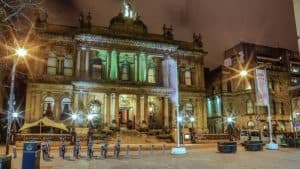Exploring the English Culture: Traditions, Heritage, & Routines

Updated On: April 23, 2024 by Panseih Gharib
Cultures, including the English culture, are intricate tapestries woven from many historical, social, and geographical threads. The English culture, synonymous with British culture due to England’s historical prominence within the United Kingdom, embodies a rich tapestry of traditions, beliefs, and practices shaped by centuries of evolution and interaction with diverse influences. From language and cuisine to religion, arts, and social norms, the English cultural landscape reflects a blend of indigenous heritage and global connections, fostering a dynamic and multifaceted identity.
Language is a cornerstone of English culture, shaping thought patterns and societal structures while reflecting historical shifts and global interactions. Meanwhile, the cuisine offers a palate of flavours that blend traditional British fare with culinary influences worldwide.
Table of Contents
English Culture Legacy
Understanding English culture is a dynamic exploration, not a static definition. It’s about appreciating the past while acknowledging the ever-evolving present, embracing both the familiar and the surprising detours.
Literary Legacies
England boasts a literary heritage that continues to resonate globally. From the evocative tales of Beowulf to the timeless plays of Shakespeare, English authors’ works have explored the human condition, social issues, and philosophical inquiries. Appreciating the past involves understanding how these literary giants shaped the English language, societal values, and humour.
Artistic Endeavors
English art offers a visual window into the nation’s past. From the majestic castles dotting the countryside, testaments to medieval power, to the exquisite paintings of J.M.W. Turner capturing the sublime beauty of nature, art forms a bridge between eras. Exploring these works fosters an understanding of the artistic movements, social commentary, and evolving aesthetics that have shaped the English identity.
Enduring Social Traditions
English culture is steeped in social customs and traditions passed down through generations. Afternoon tea, a quintessential experience, reflects Victorian-era refinement. Village fairs, with their maypole dancing and Morris dancers, offer a glimpse into pre-industrial festivities. Appreciating these traditions allows us to connect with the social fabric of the past, understanding the importance of community, leisure activities, and the rituals that have endured.
Architectural Heritage
England’s architectural landscape stands as a testament to its historical periods. Each structure tells a story, from the awe-inspiring Roman baths in Bath to the towering Gothic cathedrals like Salisbury. Understanding the architectural styles, from Norman castles to Georgian townhouses, reveals the changing political landscape, religious beliefs, and technological advancements that shaped these magnificent structures.
A Legacy of Innovation
History reveals England’s pioneering spirit. From the Industrial Revolution that transformed the world to groundbreaking scientific discoveries by Isaac Newton, the past is filled with innovation. Appreciating this legacy highlights England’s contribution to the modern world and its ongoing pursuit of progress.
English Culture Modern Influence
English culture isn’t a museum exhibit frozen in time. It’s a vibrant organism constantly evolving, shaped by contemporary influences. Here’s how the English cultural landscape continues to transform:
Multicultural Environment
Immigration has become a defining feature of modern England. Communities from across the globe have brought their vibrant cultures, enriching the food scene with new flavours, diversifying music and dance forms, and introducing unique festivals. This multiculturalism fosters tolerance, understanding, and a celebration of diversity.
Technological Revolution
Technology plays a significant role in shaping contemporary English culture. Social media platforms connect people across geographical boundaries, influencing fashion trends and communication styles. Online gaming communities create new forms of social interaction while streaming services offer diverse entertainment options.
Evolving Traditions
While some traditions remain cherished, others are reinterpreted for the modern age. For example, afternoon tea might be enjoyed alongside vegan pastries, reflecting a growing emphasis on health and sustainability. Pub culture, a cornerstone of social life, adapts to cater to diverse tastes with craft beers and themed events.
Artistic Expression Flourishes
English art continues to push boundaries. Contemporary artists explore social issues like climate change and racial inequality through diverse forms like street art and multimedia installations. The rise of independent music and film industries offers a platform for a new generation of voices to shape the cultural landscape.
A Nation Reflecting on its Past
England is increasingly revisiting its colonial past and engaging in open discussions about its complexities. Museums are re-examining historical narratives, and artists are exploring themes of race and identity. This introspection allows for a more nuanced understanding of history and a more inclusive present.
Traditions Standing the Test of Time

English culture boasts a wealth of unique traditions that have endured time, some adapting slightly to the modern world. Here are a few standouts:
- Afternoon Tea: This quintessential experience goes beyond a simple cuppa. It’s a social ritual rooted in Victorian-era etiquette, often involving finger sandwiches, scones with jam and clotted cream, delicate pastries, and a pot of tea.
- Morris Dancing: This vibrant folk tradition features dancers adorned with bells and colourful ribbons, performing energetic routines accompanied by music and rhythmic clapping. Its origins are believed to be pre-industrial, possibly connected to pagan fertility rites.
- Guy Fawkes Night: Celebrated on November 5th, this tradition commemorates Guy Fawkes’s failed attempt to blow up Parliament in 1605. Bonfires are lit, fireworks explode, and effigies of “Guy” are burned, symbolising Parliament’s triumph.
- Pantomimes: A hilarious Christmas tradition, pantomimes are theatrical productions featuring slapstick comedy, audience participation, and familiar fairy tales with a twist. Expect outrageous costumes, cross-dressing actors, and plenty of innuendo – a uniquely British blend of silliness and satire.
- Maypole Dancing: This springtime tradition involves colourful ribbons attached to a tall central pole, which dancers weave around in a coordinated fashion. It’s believed to have ancient origins, celebrating fertility and the return of spring.
- Pub Culture: The pub is a cornerstone of English social life, offering a space to meet friends, unwind after work, and enjoy a pint or two. These havens often boast rich histories, traditional pub games like darts, and a sense of community.
- Royal Family: While a source of ongoing debate, the British Royal Family remains a unique tradition, deeply embedded in the national identity. From state occasions to ceremonial guards, the royals offer a glimpse into history and tradition, attracting worldwide fascination.
English Culture’s Global Influence

English culture’s global influence is undeniable. It’s a complex tapestry woven from history, language, and popular culture that has permeated societies worldwide. Here’s a closer look at how England has shaped the cultural landscape on a global scale:
Language Influence
English has become the standard language for international communication. This dominance stems from historical factors like the British Empire and the rise of the United States as a superpower. Today, English dominates fields like science, diplomacy, and business, influencing how information is shared and accessed globally.
Pop Culture
From Hollywood blockbusters and chart-topping music to the global reach of fashion trends, English language pop culture is a juggernaut. Movies, TV shows, and music produced in England and the US heavily influence global entertainment consumption. This exposure shapes ideas of beauty, leisure activities, and even social norms across cultures.
A Legacy of Innovation
England’s history of scientific and technological advancements has a lasting impact. From the Industrial Revolution, which transformed manufacturing, to groundbreaking inventions like the World Wide Web, English ingenuity has shaped global economies and communication methods.
English Culture Educational Influence
English is the dominant language of instruction in many prestigious universities worldwide. This attracts international students, fostering a global exchange of ideas and promoting English as a necessary skill for academic and professional success.
English Culture Sports Influence
Cricket, a bat-and-ball game with English origins, enjoys immense popularity in former British colonies like India and Australia. Similarly, football (soccer) has a global following, with the English Premier League being a major attraction, influencing playing styles and tactics worldwide.
It’s important to acknowledge the complexities of cultural influence. While English culture offers opportunities for connection and shared experiences, it can also lead to homogenisation and the overshadowing of local traditions. However, there’s also a trend of adaptation. Many cultures incorporate elements of English culture while reinterpreting them to fit their unique identities.
English Culture Influential Figures
English history boasts a remarkable array of figures who shaped English culture and left an indelible mark on the world stage. Here, we explore some prominent individuals across various fields:
Literary Figures
- William Shakespeare (1564-1616): The Bard’s timeless plays have transcended language and cultural barriers, exploring universal themes of love, loss, power, and the human condition. His influence on theatre, writing, and the English language is unparalleled.
- Jane Austen (1775-1817): Austen’s witty social satires revolutionised the novel, offering a sharp yet humorous look at 19th-century English society. Her focus on female experience and nuanced characters continues to resonate with readers worldwide.
- J.R.R. Tolkien (1892-1973): The “father of fantasy literature,” Tolkien’s epic creations, such as The Lord of the Rings and The Hobbit, have captivated generations. His rich world-building and exploration of good vs. evil have influenced countless writers and filmmakers in the fantasy genre.
Scientists
- Isaac Newton (1643-1727): Newton’s groundbreaking work in physics and mathematics laid the foundation for modern science. His laws of motion and universal gravitation revolutionised our understanding of the universe.
- Charles Darwin (1809-1882): Darwin’s theory of evolution by natural selection radically transformed our understanding of life on Earth. His work sparked scientific debate, influencing fields like biology, anthropology, and philosophy.
- Alan Turing (1912-1954): A pioneer in computer science and artificial intelligence, Turing’s work during World War II significantly shortened the conflict. His theoretical contributions to computer science remain fundamental concepts in the field.
Artistic Visionaries
- William Blake (1757-1827): Poet, painter, and printmaker Blake’s visionary work explored themes of imagination, social justice, and spirituality. His unique blend of words and images continues to inspire artists and thinkers.
- J.M.W. Turner (1775-1851): Turner’s evocative landscape paintings captured nature’s sublime beauty and power. His use of light and colour revolutionised landscape painting and influenced generations of artists.
- The Beatles (1960s): This iconic band redefined popular music, blending rock and roll with various influences. Their innovative songwriting, stage presence, and cultural impact inspire musicians worldwide.
Social Reformers
- William Wilberforce (1759-1833): A leading figure in the abolitionist movement, Wilberforce’s tireless campaigning played a crucial role in ending the British slave trade. His dedication to human rights continues to inspire social justice movements.
- Emmeline Pankhurst (1858-1930): A prominent figure in the fight for women’s suffrage in the UK, Pankhurst’s militant tactics and unwavering commitment paved the way for women’s voting rights. Her legacy continues to inspire feminist movements globally.
- Alan Turing (mentioned above): While celebrated for his scientific contributions, Turing also faced persecution for his homosexuality. His story highlights the fight for LGBTQ+ rights and the importance of inclusivity.
Politicians
- Elizabeth I (1533-1603): The Virgin Queen’s reign ushered in a golden age of English literature, exploration, and national identity. Her deft political manoeuvring secured England’s place on the world stage and fostered a flourishing of arts and culture.
- Oliver Cromwell (1599-1658): A key figure in the English Civil War, Cromwell’s rise to power as Lord Protector established a brief republican government in England. His Puritan ideals left a lasting impact on English social and religious life.
- Winston Churchill (1874-1965): Prime Minister during World War II, Churchill’s leadership and unwavering resolve became symbolic of England’s defiance against Nazi Germany. His powerful speeches and wartime leadership inspire resilience in the face of adversity.
English Cuisine
English cuisine boasts a rich history and a delightful array of dishes synonymous with comfort food. Here’s a dive into some traditional English food:
Full English Breakfast
The ultimate champion of a hearty breakfast, this spread features fried eggs, sausages, bacon, baked beans, fried or grilled tomatoes, mushrooms, and sometimes black pudding for the adventurous eater. Often accompanied by toast and a strong cup of tea, it’s a fuel-efficient way to start the day.
Sunday Roast
A quintessential weekend treat, the Sunday roast revolves around a roasted joint of meat like beef, lamb, or chicken. It’s accompanied by fluffy roast potatoes (not fries!), Yorkshire puddings (savoury batter puffs), gravy, and a medley of roasted vegetables.
Fish and Chips
This national treasure features flaky white fish (usually cod or haddock) encased in a crispy golden batter, served with chunky chips (thick-cut fries). Doused in vinegar and enjoyed with mushy peas, it’s a satisfying and iconic takeaway option.
Pies
A versatile and comforting dish, pies come in savoury and sweet varieties. A classic example is a steak and kidney pie filled with chunks of beef and kidney in a rich gravy. Vegetarian options with lentils or vegetables are becoming increasingly popular.
Shepherd’s Pie/Cottage Pie
These close cousins are both hearty stews topped with creamy mashed potatoes. Shepherd’s pie traditionally uses minced lamb, while cottage pie uses minced beef.
Sweet Treats
- Scones: Buttery and crumbly scones are a quintessential teatime treat. They come in plain and fruit varieties and are best enjoyed warm with clotted cream (a thick, spreadable cream) and jam.
- Victoria Sponge Cake: This classic teatime cake features two layers of light and fluffy vanilla sponge cake sandwiched with raspberry jam and whipped cream. Its simple elegance and delightful taste have made it a timeless favorite.
- Apple Pie: A dessert enjoyed worldwide, the English version features tender apples baked in a flaky pastry crust. It’s a comforting and nostalgic treat, often served with a dollop of custard or ice cream.
- Sticky Toffee Pudding: This decadent dessert features a rich, date-infused sponge cake topped with a sweet toffee sauce. It’s guaranteed to satisfy any sweet tooth.
- Trifle: A layered dessert with a playful element of surprise, the trifle typically features sponge cake, fruit, custard, whipped cream, and sometimes jelly. It’s a delightful and visually appealing way to end a meal.
Conclusion
Whether you’re drawn to the timeless beauty of the English countryside, the bustling energy of its cities, or the enduring power of its artistic expressions, English culture has something to offer everyone. So, delve into its history, savour its traditions, and discover the magic that continues to capture hearts and minds around the world.






